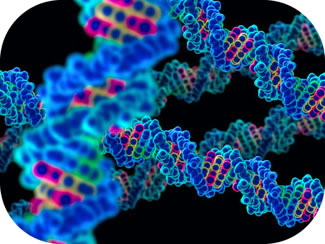Genetics
 Research has recently revealed that there may be some genetic factors related to a higher risk of developing herniated discs. One particular study showed that those with an immediate family member, with a disc-related lower back pain, were four times more likely to have lower back pain themselves. (2) Risk increased when the individual in the study had a second, or even third, relative with a herniated disc: “While not 100% conclusive, this is very strong evidence that there is a genetic component to disc degeneration and disc herniation.” (3) Some of these factors may not only be genetic, but may also stem from the way we are raised. In households with diets that can lead to obesity, there is more risk for herniated discs. Also smoking, and other non-active lifestyles may lead to herniated discs; leading lifestyles such as these may be a result of learning the behaviors from family. Since we still do not know the answer between nature vs. nurture, there is no exact answer as to whether genetics plays a role in the development of herniated disc and other back issues. This research about genetics being a cause of herniated discs and other back problems is fairly new. As of now, there is not a lot of research or evidence to directly link genetics to herniated discs, but the research that has been conducted about this topic is presenting some relevant connections between genetics and slipped discs. Perhaps, as science advances, we will begin to see a more direct correlation (and possibly causation) between genetics and herniated discs.
Research has recently revealed that there may be some genetic factors related to a higher risk of developing herniated discs. One particular study showed that those with an immediate family member, with a disc-related lower back pain, were four times more likely to have lower back pain themselves. (2) Risk increased when the individual in the study had a second, or even third, relative with a herniated disc: “While not 100% conclusive, this is very strong evidence that there is a genetic component to disc degeneration and disc herniation.” (3) Some of these factors may not only be genetic, but may also stem from the way we are raised. In households with diets that can lead to obesity, there is more risk for herniated discs. Also smoking, and other non-active lifestyles may lead to herniated discs; leading lifestyles such as these may be a result of learning the behaviors from family. Since we still do not know the answer between nature vs. nurture, there is no exact answer as to whether genetics plays a role in the development of herniated disc and other back issues. This research about genetics being a cause of herniated discs and other back problems is fairly new. As of now, there is not a lot of research or evidence to directly link genetics to herniated discs, but the research that has been conducted about this topic is presenting some relevant connections between genetics and slipped discs. Perhaps, as science advances, we will begin to see a more direct correlation (and possibly causation) between genetics and herniated discs.
References:
- Delauche-Cavallier MC, Budet C, Laredo JD, Debie B, Wybier M, et al. Lumbar disc herniation. Computed tomography scan changes after conservative treatment of nerve root compression. Spine.1992;17:927–33
- Alpesh A. Patel, MD, department of orthopaedics, University of Utah School of Medicine, Salt Lake City.
- Yuichiro Hirose et al. A Functional Polymorphism in THBS2 that Affects Alternative Splicing and MMP Binding Is Associated with Lumbar-Disc Herniation" American Journal of Human Genetics May 2008. 82 (5): 1122–1129.
- Hofmann F, Bolm-Audorff U, Michaelis M, et al. Berufliche Wirbelsa¨ulenerkrankungen bei Bescha¨ftigten im Pflegeberuf— epidemiologische und versicherungsrechtliche Aspekte. U¨bersicht u¨ber international publizierte Studien. Versicherungsmedizin 1997;49:220–4
- McCarron RF, Wimpee MW, Hudkins PG, Laros GS The inflammatory effect of nucleus pulposus. A possible element in the pathogenesis of low-back pain. Spine 12. Oct 1987. (8): 760–4.

